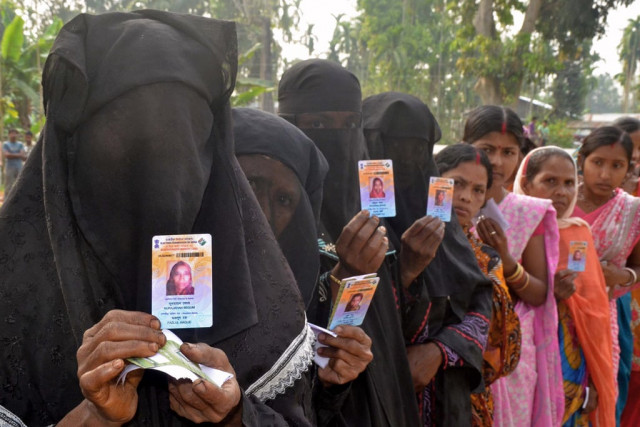The world’s biggest election
If Modi become PM, it will be difficult for N Sharif to take bold initiatives with regard to ties with India.

Indian Muslim voters pose with identification as they wait in line to vote outside a polling station in Koliabor, in Assam state's Nagoan district some 180 kms east of Guwahati, on April 7, 2014. PHOTO: AFP

That said, the interest in what transpires in India over the next few weeks obviously goes well beyond the purpose of taking notes on democracy. Any general election in India would garner keen interest in Pakistan — but this one will elicit special attention. That is, of course, given that most predictions have Narendra Modi’s Bharatiya Janta Party (BJP) coming out on top. A Modi win has made many, if not most, in Pakistan nervous — and for good reason. Aside from the Hindu nationalist leanings associated with any BJP leader, the former chief minister of Gujarat is actually directly tainted for his alleged involvement in the anti-Muslim riots that saw at least a thousand (non-governmental estimates put the figure close to 2,000) killed in 2002 in his province. And that’s what makes most uneasy with the prospect of Modi as premier. The optimists hold the belief that BJP governments have generally been good for India-Pakistan ties — and also point to the positive history between prime ministers Nawaz Sharif and Atal Bihari Vajpayee, the Lahore declaration, et al. But clearly Vajpayee was considerably less hardline than Modi is, and did not carry the same sort of violent anti-Muslim baggage. Yet, it is an accepted theory that premiership inevitably pushes even the most hardline — from the right or the left — to the centre given the ground realities of governing, and then there is Modi’s pro-business and economic bent (which means pushing for more economic ties with Pakistan). People will counter by pointing to Modi’s nomination of no Muslim candidates in Uttar Pradesh, India’s largest state, which has a 12 per cent Muslim population and where deadly communal riots erupted last year in Muzaffarnagar.
The debate on what sort of leader Modi will make can be endless, and perhaps, only once he has taken office can we safely gauge what the reality will be. But there are certain realities that should be taken into account. First, given the strong perceptions of Modi’s anti-Muslim bent in Pakistan, it will certainly be more difficult for Prime Minister Nawaz Sharif to take the bold initiatives he promised with regard to ties with India. The government has put its India policy on hold for the outcome of the elections at the moment. Whether or not Modi wants to do business straightaway, and that’s obviously a big if, Nawaz will come under tremendous pressure from the conservative segments of Pakistan — a large chunk of which is part of his party’s vote bank — to take a more reserved stance on India. This will be a tricky period for India-Pakistan ties. In both countries, populism will take root more than usual — and that is where both need to be careful and let measured diplomacy and sanity prevail over raw public sentiment. Close cooperation between India and Pakistan is long overdue and has been sidetracked by all sorts of events and issues. Let this not be yet another one.
Published in The Express Tribune, April 8th, 2014.
Like Opinion & Editorial on Facebook, follow @ETOpEd on Twitter to receive all updates on all our daily pieces.
















COMMENTS
Comments are moderated and generally will be posted if they are on-topic and not abusive.
For more information, please see our Comments FAQ